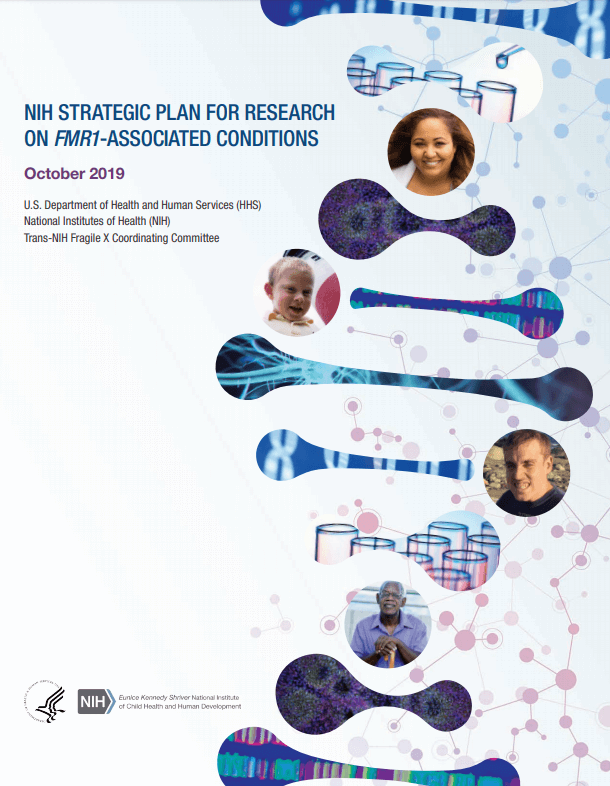NFXF Archive
Information on this page was accurate at the time of publication, and has not been updated.
The National Institutes of Health (NIH) is, by far, the biggest funder of Fragile X research – to the tune of around $40M/year. That is why their strategic plan to guide Fragile X research is so important, and why we were involved at each public step to help guide it. The NIH just released their Fragile X Research Plan (https://www.nichd.nih.gov/newsroom/news/111219-FMR1) which identifies research priorities and aims to coordinate research efforts. While the plan is surprisingly readable, we have pulled a few key excerpts below.
The NFXF played a role in updating the initial 2007 NIH FX Research plan – from Jayne’s participation in the updating workshop in 2018, to our assertive  efforts to collect and share feedback on the draft plan from the FX community along with FX experts. Thank you to all who helped provide comments. It’s terrific to see how much of the plan aligns with our strategic priorities to grow awareness, build community, and facilitate research. We will continue our partnership with NIH to help achieve these updated goals.
efforts to collect and share feedback on the draft plan from the FX community along with FX experts. Thank you to all who helped provide comments. It’s terrific to see how much of the plan aligns with our strategic priorities to grow awareness, build community, and facilitate research. We will continue our partnership with NIH to help achieve these updated goals.
NIH Fragile X Research Plan – Key Excerpts & NFXF Initiatives
Infrastructure, Research Training, and Career Development – Although a strong cadre of research scientists is dedicated to increasing knowledge of FMR1-associated conditions, there is still a clear need for more scientists to build on current efforts. Because of the broad phenotypic implications of FMR1 mutations and premutations, the next generation of scientists must be properly prepared with knowledge of a wide range of specialty conditions. Expertise is urgently needed in genetics, pediatrics, neurosciences, gynecology, fertility, stem cells, mental health, and other areas. Identifying and training promising researchers now will maximize their opportunities to capture and expand on the knowledge of senior researchers and clinicians in the field. Moreover, the infrastructure that currently supports scientists in FMR1-associated condition fields may be insufficient to meet the needs for new animal models, tissue and cell culture studies, and larger scale human phenotyping and clinical studies at facilities that are accessible to families and patients. Supporting new collaborative efforts in these areas may require consortia, tissue and data banks, and enhanced training efforts.
- NFXF Initiatives – Support of FXCRC; NFXF Biobanktm and distance learning program to train FX professionals
Promoting Collaborations Between Basic Scientists and Clinicians – Clinicians in the community are crucial to the success of efforts to better understand, diagnose, prevent and treat FMR1-associated conditions. Improving collaborations with community-based providers may enable researchers to better understand phenotypes, document variations in how the disorder presents itself, identify potential biomarkers and outcome measures, and develop new interventions. For FXTAS and FXPOI, community partnerships will be especially critical to raising awareness and encouraging participation in clinical research. For all FMR1-associated conditions, collaborations with the broad community of clinical providers are a critical step in ensuring that promising research findings are disseminated and implemented so that all affected individuals may benefit, not just those with the means and wherewithal to access care at academic medical centers.
- NFXF Initiatives – Research Readiness Program, Awareness activities, and Educational events
Ethical, Legal, and Social Issues in Premutation Screening and Testing – Advances in technology have rapidly increased the use of genetic screening and testing. Carrier screening and genetic sequencing for FMR1-associated conditions raise many ethical and social issues, including (among others): • Ethical issues related to prenatal diagnosis • Diagnosis of conditions with limited or no treatment options • Ethical issues related to identifying risks for other family members based on screening of one relative • Ethical implications of correcting human disease via gene editing technologies that impact the germline and future generations It will be critical for researchers on FMR1-associated conditions to be cognizant of these ethical issues, and to incorporate them into the design and conduct of future research.
- NFXF Initiatives – Newborn Screening Project advisor

